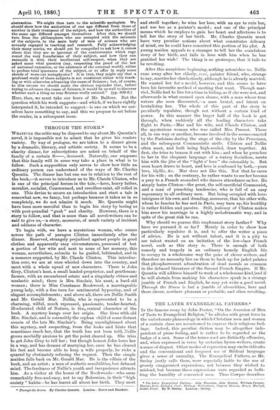THROUGH THE STORM.*
Wm,. TETER the critic may be disposed to say about Mr. Quentin's novel, it is impossible not to admit that he gives his readers 'variety. By way of prologue, we are taken to a dinner given by a dramatic, literary, and artistic society. It seems to be a -charity dinner, for subscriptions are asked on behalf of the family of a certain S—, deceased. Naturally, one supposes that this family will in some way take a place in what is to follow. Such a supposition only serves to show how little an ordinary person can understand of the ways of Mr. Charles Quentin. The dinner has but one use in relation to the rest of the book,—it serves to introduce us to Mr. Claude Clinton, who is one of the principal heroes in the tale,—hero, heavy father, moralist, socialist, Communard, and creedless saint, all rolled in one. This device to secure an introduction and start a tale is somewhat new, we fancy, but perhaps because it takes us in so -completely, we do not admire it much. Mr. Quentin might have been more merciful than to begin his story by boring us with post-prandial "gush" and charity. However, there is a story to follow, and that is more than all novel-writers can be said to give us,—a story, moreover, of much variety of incident and oddness of character.
To begin with, we have a. mysterious woman, who comes scrose the path of paragon Clinton immediately after the .dinner. Reserved, strangely prejudiced against people in good book, and an artist ; a man of msthetic sensibilities, but debased -mind. The freshness of Nellie's youth and inexperience attracts him. As a visitor at the house of the Rookwoods—who seem remarkably free-and-easy, not to say Bohemian, in their "high society" habits—he has learnt all about her birth. They meet • Through the Storm. By Charles Quentin. London : Hurst and Blackett. and stroll together; he wins her love, with an eye to ruin her, and use her as a painter's model ; and one of the principal means which he employs to gain her heart and affections is to tell her the story of her birth. Mr. Charles Quentin must have very peculiar notions about what constitutes delicacy of mind, ere he could have conceived this portion of his plot. A young maiden appeals to a stranger to tell her the scandalous story of her birth, and falls in love with him when he has gratified her wish ! The thing is so grotesque, that it fails to be revolting. After this auspicious beginning, nothing astonishes us. Nellie runs away after her elderly, painter friend, who, strange to say, marries her clandestinely, although he is already married. He wanted her for a model, however, and this seems to have been his favourite method of meeting that want. Though mar- ried, Nellie had to live for a time in hiding, as if she were not, and afterwards in what seemed open shame, with a man whose true nature she soon discovered,—a man brutal, and intent on brutalising her. The whole of this part of the story is peculiarly repulsive, though not without a certain kind of power. In this manner the larger half of the book is got through, when suddenly all the leading characters take flight to Paris,—Mar and his wife, and Claude Clinton, and the mysterious woman who was called Mrs. Prescot. These all, in one way or another, become involved in the scenes enacted by the Parisians during the siege of the city by the Prussians, and the subsequent Communistic strife. Clinton and Nellie often meet, and both being high-souled, draw together. At first, she tries to brazen it out with him ; and when he preaches to her in the eloquent language of a watery Socialism, meets him with the jibe of the "light o' love" she ostensibly is. But soon heart draws to heart, and love is confessed by both,—pure love, idyllic, .8:c. Mar does not like this. Not that he cares for his wife ; on the contrary, he rather wants to see her become a prey to a French scoundrel who dances attendance on her. He simply hates Clinton—the great, the self-sacrificial Communist, and a man i of preaching tendencies, who is full of an easy supremacy to all ordinary men. But being occupied with love- intrigues of his own, and dreading, moreover, that his other wife, whom he fancies he has met in Paris, may turn up, hi hostility is rather hidden and passive. Still, jealousy of Clinton makes him avow his marriage in a highly melodramatic way, and in spite of the great risk he ran. Why should we pursue this unpleasant story farther P Why have we pursued it so far P Merely in order to show how particularly repulsive it is, and to offer the writer a piece of advice. He is not without talent, and it is a pity to see talent wasted on an imitation of the low-class French novel, such as this story is. There is enough of both comedy and tragedy in an ordinary homely English life to occupy in a wholesome way the pens of clever writers, and therefore no necessity lies on them to hash up for jaded palates that phosphorescent adumbration of dead morals so common in the debased literature of the Second French Empire. If Mr. Quentin will address himself to work of a wholesome kind,!and if he will abstain from making his characters speak in a strange jumble of French and English, he may yet write a good novel. Through the Storm is but a jumble of absurdities, here and there clever, nowhere pleasant or probable, and often revolting.


































 Previous page
Previous page